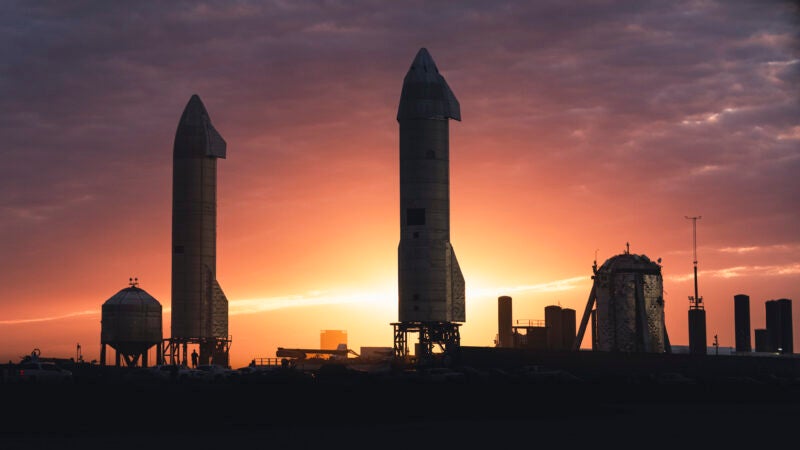Latest News

SpaceX Starship prototypes in Boca Chica, Texas. Photo: SpaceX
Major space launchers previewed how their businesses will change as new launch vehicles come available in 2022 during Euroconsult’s World Satellite Business Week event on Monday.
SpaceX Vice President of Commercial Sales Tom Ochinero was bullish that Starship will have its first orbital flight by early 2022, in January or February. With Falcon 9 being the most active launch vehicle, SpaceX is planning to shake up the market even further with Starship, which will be fully reusable.
Ochinero said that SpaceX is currently selling both Falcon 9 and Starship rockets, and SpaceX plans to operate both commercially at the same time. Forward-thinking customers are leaving the option open on launch contracts to upgrade to Starship in the future, he said.
“The plan is to keep flying them until the market migrates to what the market decides is the winner,” Ochinero said. “We think it’s going to be clearly Starship, but there is no plan right now to shut down production — especially with the certification [with the] U.S. government and military. It’s not a quick switch flip.”
“For the foreseeable future, I am selling all of them, including Falcon Heavy,” he added.
European launcher Arianespace is awaiting the first flight of the Ariane 6 medium-heavy launch vehicle, which will replace the Ariane 5. The first test flight was initially scheduled for 2020, but has been delayed several times. Arianespace CEO Stephane Israel said Monday that the first fight for Ariane 6 is expected for the second half of 2022, but it’s too early to be more specific than that.
“There will be no delay of Ariane 6 because we are now at the very last mile to launch,” Israel emphasized.
Arianespace only has six Ariane 5 vehicles left waiting in the wings that have been purchased, including the Ariane 5 for the upcoming OneWeb launch.
The French launcher will introduce another new vehicle before the Ariane 6 — the small lift Vega C, expected in the first half of the year. Israel said Vega C will operate alongside Vega until 2023.
Blue Origin was the least insistent that its upcoming rocket, New Glenn, will launch in 2022. Jarrett Jones, senior vice president of the New Glenn program, said that after Blue Origin lost out on the National Security Space Launch (NSSL) service contracts to SpaceX and United Launch Alliance (ULA), the launcher refocused the vehicle on its commercial customers.
“We were able to reconfigure and focus on our commercial customers — [those] that we have contracts with and the ones that we are going after – and really align with their needs,” Jones said. “Yes we have a target to launch, but we will launch when we’re ready. We are aligned with our customers and many of them are very excited to get to this capability that we’re bringing to the market.”
United Launch Alliance (ULA) is well known to be dealing with delays because of Blue Origin, waiting on the BE-4 engine for its Vulcan Centaur rocket. Mark Peller, vice president of Major Development for ULA, said Monday that the initial two engines are expected in the first quarter of 2022, after missing the previous delivery plan for the end of this year.
But further delays at Blue Origin may make a 2022 Vulcan flight unlikely. Eric Berger of Ars Technica reported Monday that Blue Origin is unlikely to deliver two versions of the BE-4 rocket engine before at least the second quarter of 2022, according to two sources.
Peller was insistent on the panel that Vulcan will fly in mid-2022. He also expects Vulcan to have a better reception in the commercial market than previous ULA rockets.
“It offers heavy lift capability, even greater than what we do with Delta-4 in a single vehicle. In terms of dollars per pound orbit, it is a significant improvement over Atlas and will improve our competitiveness across all the markets we serve,” Peller said. “It is also very flexible in terms of payload accommodations, as well as a very capable upper stage that supports multiple deployments on a single mission to really enable affordable multi-launch.”
Tiphaine Louradour, President of International Launch Services (ILS) expressed concern about the availability of flight-proven launch vehicles on the market, and restrictions in the U.S. against the Russian Proton rocket, which ILS commercializes. Lourador argued that these restrictions limit choice for commercial satellite operators.
“ILS’s belief is that there should not be any restrictions imposed on the space sector. There are decades and decades of long-lasting, international relationships that need to be maintained and unprotected,” Louradour said.
Get the latest Via Satellite news!
Subscribe Now